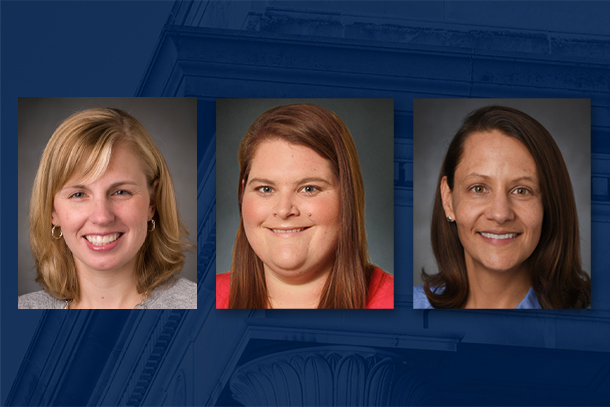
From left to right: Sarah Zappe, assistant dean for teaching and learning and director of the Leonhard Center for Enhancement of Engineering Education; Stephanie Cutler, director of assessment and instructional support in the Leonhard Center and associate research professor; and Andrea Gregg, director of online pedagogy and assistant teaching professor of mechanical engineering. Credit: Penn State College of Engineering. All Rights Reserved.
Q&A: A conversation with three experts on engineering education research
June 26, 2023
By Mariah R. Lucas
UNIVERSITY PARK, Pa. — Three Penn State engineering faculty members co-authored book chapters in the recently published International Handbook of Engineering Education Research, a comprehensive overview of research on engineering education and its practical applications to teaching and learning in the classroom.
We spoke with the three authors — Sarah Zappe, assistant dean for teaching and learning and director of the Leonhard Center for Enhancement of Engineering Education; Andrea Gregg, director of online pedagogy and assistant teaching professor of mechanical engineering; and Stephanie Cutler, director of assessment and instructional support in the Leonhard Center and associate research professor — about their contributions to the handbook, and why such a handbook is needed.
Q: Why is a handbook for engineering education research needed?
Cutler: Engineering education research is still a developing field of inquiry. The American Society for Engineering Education is turning 130 this year, but for the majority of those years, engineering education primarily focused on the practice of better educating engineers, without much systematic research in the discipline. This handbook is meant to help make engineering education research more accessible and applicable for engineering education practitioners, reflecting the last several decades of research that has been done to inform the education of engineers.
Gregg: There has been a lot of growth in engineering education research since the last handbook was released in 2015. With many new doctoral granting programs in engineering education and many more faculty focusing on conducting research in this area, the field needed an updated handbook. This new book also has a much greater emphasis on cultural contexts; educational technologies; and diversity, equity and inclusion.
Q: What is your chapter about?
Cutler: My chapter is titled “The Overlooked Impact of Faculty on Engineering Education,” which highlights the important, but not often discussed, role of faculty within engineering education. For a field largely made up of faculty members, we don’t often turn the lens back on ourselves to explore the faculty experience and how that impacts a student’s educational experience. This chapter highlights research done beyond engineering education around what it means to be a faculty member and the impact of faculty members on engineering education.
Gregg: I wrote “Engineering Education and Online Learning” to emphasize a few key points about online learning within engineering education. First, and perhaps most importantly, what we experienced during the emergency remote transition due to COVID-19 is not representative of intentionally designed, high quality online education. Second, there has been over 30 years of educational theory and empirical research focused on how to design and teach online. We should be relying on that work rather than unnecessarily, and at times painfully, re-learning well-established lessons. Lastly, engineering education has a unique opportunity to become a leader when it comes to strategically advancing what we do with online learning to transform educational experiences for both students and faculty.
Zappe: My chapter, “Teaching for Creativity, Entrepreneurship, and Leadership,” provides an overview of three areas — creativity, entrepreneurship and leadership — that are often emphasized in the development of engineering students’ professional skillsets. In the overview, we address the lack of emphasis on diversity, equity and inclusion related to teaching these three areas within the engineering context. Our hope is that this chapter will provide a basis for encouraging others to explore research gaps and offer more information on how to better provide quality instruction to engineering students.
Q: What does research on engineering education reveal?
Zappe: Engineering education research asks the questions: Who is interested in a career in engineering and why? What practices best prepare students to be engineers, and which ones inadvertently discourage students from becoming engineers? What skills do engineers need to be successful and how do we best develop them? How do you help a student to see themselves as an engineer and help them feel like they belong within the field? The discipline also explores research methods on how we can answer these questions.
Part of my chapter focuses on how to teach students to be creative and how to infuse creativity into teaching. It’s not an easy task, as most of the time, the assignments in courses do not require students to be creative. To help students be more creative, we need to develop assignments that give them the opportunity to demonstrate that creativity, such as in using technologies like virtual and augmented reality in assignments. I have a theory that infusing more creativity into the curriculum will help to draw in a different population of learners, helping to create more diversity among engineering students. I’m also starting to explore how to integrate the arts into engineering.
Cutler: One of the key points I make about faculty in my chapter is that studying them gets complicated. Faculty do not just do one task; they do many different tasks throughout their careers. Their decisions aren’t just about how they wish they could teach their course, but sometimes they have to make strategic decisions about the small amount of time they have that’s not being spent on everything else. They are people, and people are always complex.
Gregg: Engineers invent, discover and implement tools, technologies and methods that transform the world. I hope that engineering educators come to see themselves as innovators not just within the traditional domain of engineering but also with how engineering teaching and learning takes place, implementing best practices gleaned from rigorous educational theory and empirical research.



